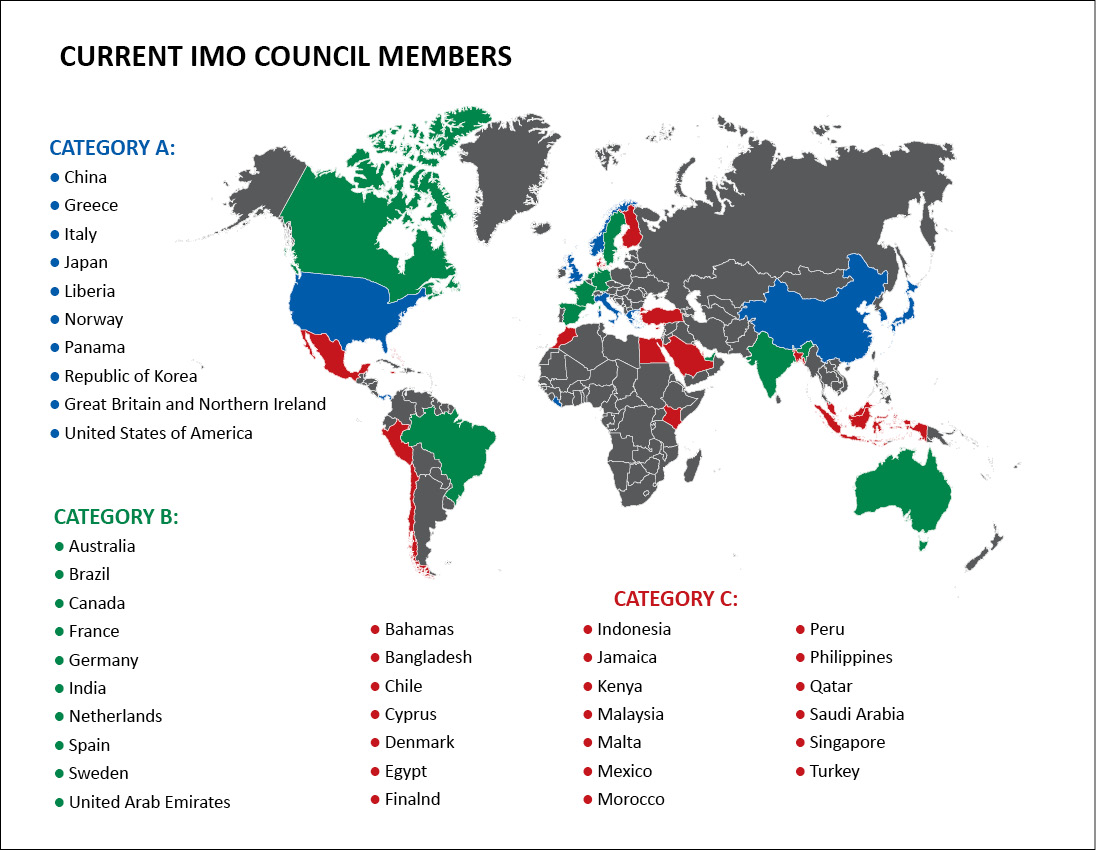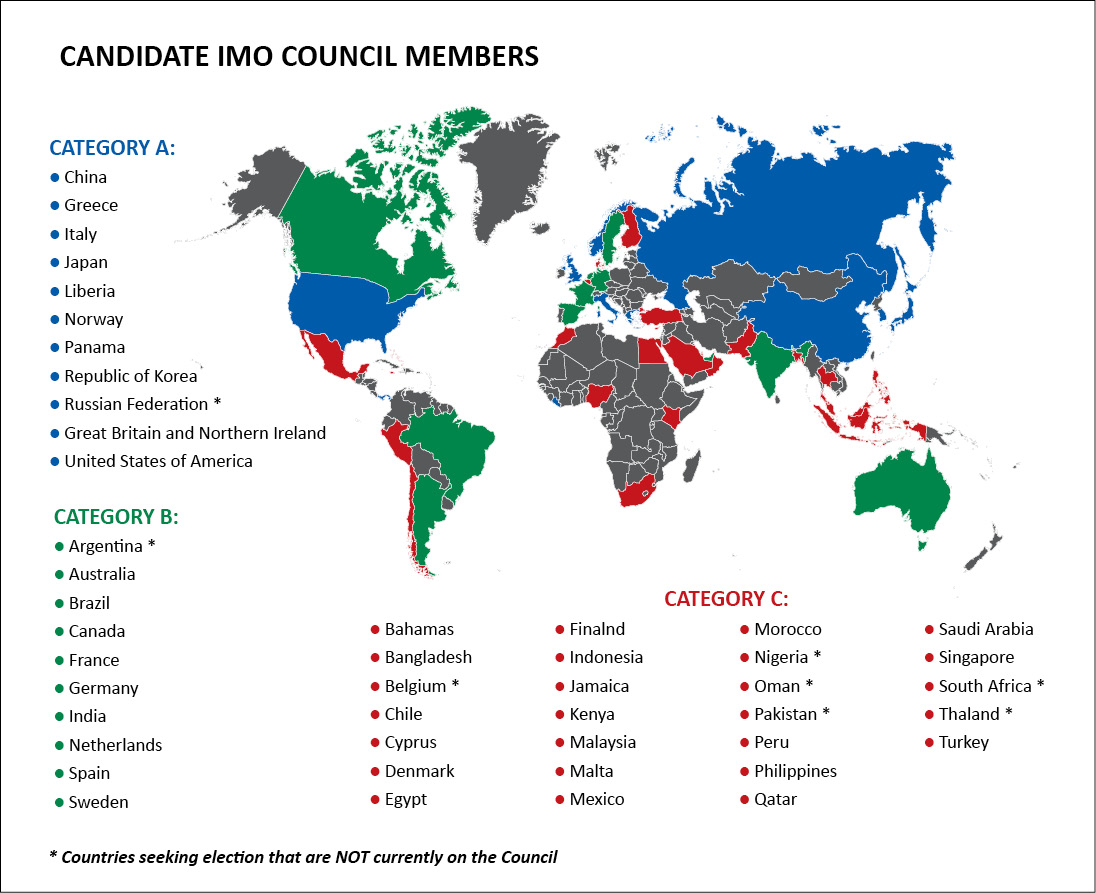What are Africa’s chances for IMO Council election?
Representation at IMO in the spotlight
Six African Member States have set their sights on claiming a position on the International Maritime Organisation’s Council in the elections scheduled for December this year, but it is unlikely that all will be successful. Editor, Colleen Jacka, looks at what is at stake.
As the only African hopeful in Category A, Liberia faces strong competition from ten other countries. Currently a member of the Council in this category, their re-election does seem likely given that the only candidate up for election that is not currently on the Council is the Russian Federation.
Strong lobbying before the 2023 elections saw countries call for a motion to disqualify the Russian Federation from elections due to their aggression against the Ukraine ending their consistent representation on the Council since the IMO’s First Session. With no end to this conflict, Russia may face similar sentiment in London this year.
Replaced on the Council in Category A by Liberia, voters will be hard-pressed to deny the African country’s strength as a major flag state.
Liberia’s robust Ship Registry hosts more than 5,000 registered vessels representing more than 200 million gross tonnage. In addition, according to their election submission, this small African country is the largest contributor to IMO’s annual budget.
Reading through the submissions in this category, the United States of America’s (USA) stands out, not for its comprehensiveness in outlining their position as a maritime nation, but more for its presumptuous tone. Unlike most of the submissions, the USA does not provide much depth as to why they should be considered and seems to rely on their past inclusion.
Had there been more candidates seeking to join Category A, this may have been risky but only having to beat one other contender (likely Russia) it’s unlikely to be to their detriment. This could have been a different story, however, if another strong contender had taken the opportunity to campaign against the current USA administration’s public position on climate change and the use of alternative fuels and renewables.
Should Russia maintain its eligibility for election this year resulting in one of the 11 candidates not being elected, that candidate can, according to the rules of election, be considered for another category. This could have implications for Category B voting.
With no African candidates on the ballot in Category B, the only country seeking election that is not currently on the Council is Argentina.

Strong competition
There is no doubt that both South Africa and Nigeria have legitimate claims for election, but they will face strong competition if they aim to usurp one of the current African countries during voting.
It’s Category C where the real competition lies. Of the candidates up for election; Belgium, Nigeria, Oman, Pakistan, South Africa and Thailand will be seeking to disrupt the current status quo as States that are not presently Council members. The Bahamas, Bangladesh, Chile, Cyprus, Denmark, Egypt, Finland, Indonesia, Jamaica, Kenya, Malaysia, Malta, Mexico, Morocco, Peru, the Philippines, Qatar, Saudi Arabia, Singapore and Türkiye are all aiming to maintain their seat.
Hoping to represent the interests of Africa are Egypt, Kenya, Morocco, Nigeria and South Africa who have all set their sights on claiming one of the 20 available seats.
As two of the biggest economies in Africa, South Africa and Nigeria have been particularly vocal in their campaigns to reclaim a place on the Council over the last few months. Both have been elected before, with South Africa losing their seat in 2019 and Nigeria in 2009.
While both countries emphasise their strategic geographical importance, South Africa’s submission focuses on its commitment to policy as well as environmental leadership and its ability to promote maritime safety through its infrastructure and incident response capacity.
Nigeria’s submission focuses on its role in maritime security within the Gulf of Guinea – highlighting how their Deep Blue Project has addressed issues of piracy and robbery at sea. Recognising the global shortage of seafarers, Nigeria also emphasises their commitment to seafarer development, noting that the country has a registry of 65,000 certified personnel.
There is no doubt that both South Africa and Nigeria have legitimate claims for election, but they will face strong competition if they aim to usurp one of the current African countries during voting.
It is unlikely that all of the African candidates can expect to gain a place on the Council. In 2023 Egypt scored 142 votes placing it in the top five while Morocco’s tally was 132 votes and Kenya’s 128. With only 114 votes in 2023, South Africa was placed second to last, ahead of only Poland. Nigeria, however, was not a candidate in the last election.
Vote Count in 2023:
- Singapore 152
- Malta 143
- Saudi Arabia 143
- Turkiye 143
- Egypt 142
- Mexico 136
- Philippines 136
- Chile 135
- Indonesia 135
- Malaysia 134
- Bahamas 133
- Cyprus 132
- Morocco 132
- Denmark 130
- Qatar 130
- Bangladesh 128
- Kenya 128
- Peru 123
- Jamaica 120
- Thailand 116
- Belgium 115
- South Africa 114
- Poland 106
Given their strategic importance and active involvement in shipping routes, Egypt is likely to keep their seat having served on the Council since 1977 without a break. At this point, both Morocco and Kenya have more than a decade of uninterrupted representation on the Council. If one current African seat must make way for either South Africa or Nigeria, then Kenya’s position is possibly more precarious than Morocco’s based on the 2023 vote.
Like the submissions from South Africa and Nigeria, Kenya emphasises their strategic geographical position and voters will have to decide which region needs more representation on the next Council.

1619